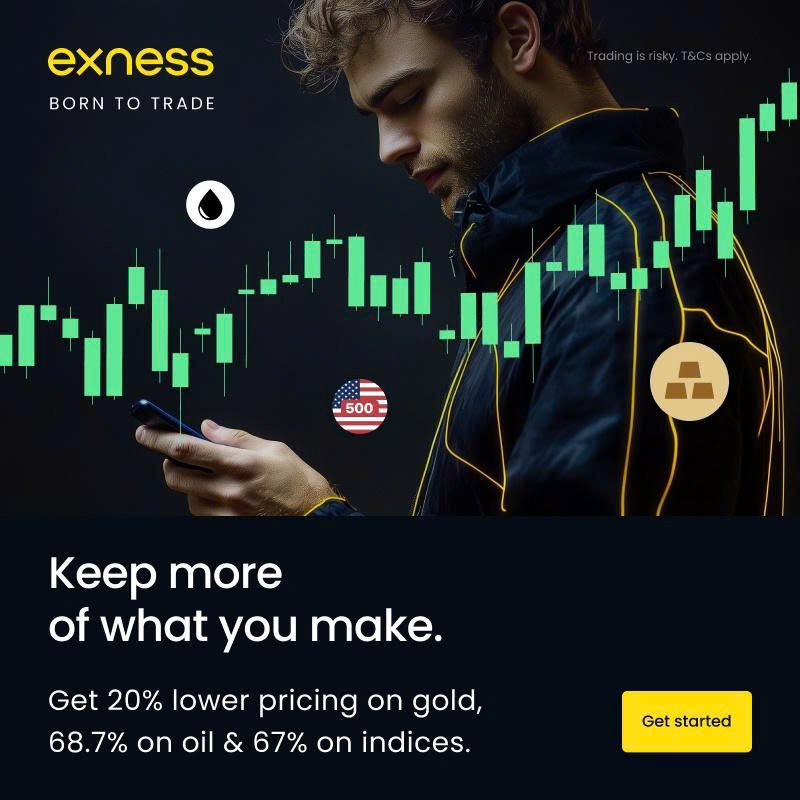
7 minute read
Is Forex Trading Legal in Oman? A Comprehensive Guide
from Forex Legal Oman
Yes, forex trading is legal in Oman, but it comes with some nuances you need to understand before diving in. The Sultanate of Oman has a growing economy, and with increased internet access, more Omanis are exploring the global forex market. However, the regulatory landscape and broker choices can feel like navigating a desert without a map. In this article, I’ll break down everything you need to know about forex trading in Oman—its legality, regulations, risks, and how to trade safely. Let’s get started.
Top 4 Best Forex Brokers in Oman
1️⃣ Exness: Open An Account or Visit Brokers 🏆
2️⃣ XM: Open An Account or Visit Brokers 💥
3️⃣ JustMarkets: Open An Account or Visit Brokers ✅
4️⃣ Quotex: Open An Account or Visit Brokers 🌐
Understanding Forex Trading in Oman
Forex trading, or foreign exchange trading, is the act of buying and selling currencies to profit from exchange rate fluctuations. It’s the largest financial market globally, with over $6 trillion traded daily. For Omanis, forex offers a way to diversify investments beyond the oil-driven economy. But is it fully legal, and how is it regulated?
The short answer is that forex trading is permitted in Oman, overseen by the Central Bank of Oman (CBO) and the Capital Market Authority (CMA). However, there’s a catch: Oman doesn’t have a robust local forex brokerage scene. Most Omani traders rely on international brokers, which introduces a regulatory gray area. While trading with these brokers is legal, they often operate under foreign jurisdictions, not directly under the CBO or CMA. This means you need to be extra cautious when choosing a platform.
The Legal Framework: What You Need to Know
The CBO is the primary authority managing Oman’s financial transactions, ensuring transparency and economic stability. The CMA, on the other hand, supervises investment firms and brokers, focusing on market fairness and investor protection. Together, they create a framework where forex trading is allowed but tightly monitored to prevent fraud and money laundering.
Here’s the deal: local brokers, if they exist, must comply with strict CBO licensing requirements, including capital thresholds and anti-money laundering (AML) policies. However, since there are few (if any) domestic forex brokers in Oman, most traders turn to international platforms like Exness, XM, or AvaTrade. These brokers are typically regulated by reputable bodies like the UK’s Financial Conduct Authority (FCA), Cyprus Securities and Exchange Commission (CySEC), or Australia’s ASIC. While this doesn’t make them illegal in Oman, it means disputes may fall under foreign jurisdictions, which can complicate things.
The absence of specific laws banning international brokers allows Omani traders to participate freely. However, the CBO and CMA encourage traders to use regulated platforms to minimize risks. So, while forex trading is legal, it’s on you to do your homework and pick a trustworthy broker.
Why Forex Trading Is Gaining Traction in Oman
Oman’s economy, historically tied to oil, is diversifying, and forex trading is catching on as a way for individuals to tap into global markets. Here are a few reasons why it’s becoming popular:
24/5 Market Access: The forex market runs round-the-clock from Sunday to Friday, perfect for traders juggling day jobs or other commitments.
High Liquidity: With trillions traded daily, you can enter and exit trades easily.
Leverage Opportunities: Brokers offer leverage, letting you control larger positions with less capital (though this is a double-edged sword).
Diverse Instruments: Beyond currencies, you can trade commodities, indices, and even cryptocurrencies on many platforms.
Low Entry Barriers: You can start with as little as $100 on some brokers, making it accessible for beginners.
But popularity doesn’t mean it’s all smooth sailing. Forex trading is high-risk, and without proper knowledge, you could lose more than you bargained for.

✅ Trade with Exness now: Open An Account or Visit Brokers 👈
Risks of Forex Trading in Oman
Let’s be real—forex trading isn’t a get-rich-quick scheme. It’s exciting, but it comes with serious risks. Here’s what to watch out for:
Market Volatility: Currency prices can swing wildly due to economic news or geopolitical events.
Leverage Risks: High leverage (up to 1,000:1 in some cases) can amplify profits but also wipe out your account with one bad trade.
Unregulated Brokers: Some shady brokers operate without oversight, putting your funds at risk.
Lack of Local Oversight: Since most brokers are international, resolving disputes can be tricky.
To stay safe, stick to regulated brokers, use risk management tools like stop-loss orders, and never trade with money you can’t afford to lose.
How to Trade Forex Legally and Safely in Oman
Ready to start trading? Here’s a step-by-step guide to doing it right:
1. Educate Yourself
Before you trade, learn the basics. Understand currency pairs (like EUR/USD), pips, spreads, and leverage. Platforms like Exness and XM offer free webinars, tutorials, and demo accounts to practice without risking real money. Knowledge is your first line of defense.
2. Choose a Regulated Broker
This is non-negotiable. Look for brokers regulated by top-tier authorities like the FCA, CySEC, or ASIC. Some solid options for Omani traders include:
Exness: Known for tight spreads, MT4/MT5 platforms, and Arabic support.
XM: Offers Islamic accounts, negative balance protection, and extensive educational resources.
AvaTrade: Great for beginners with its user-friendly platform and Trading Central plugin.Always verify a broker’s license on their website or regulator’s database. Avoid platforms promising “guaranteed profits”—they’re usually scams.
3. Open a Trading Account
Most brokers make this easy. You’ll need to provide personal details and verify your identity (KYC process) with documents like a passport or bank statement. Many brokers offer Islamic accounts, which are swap-free to comply with Sharia principles—a big plus for Omani traders.
4. Choose a Trading Platform
Popular platforms in Oman include MetaTrader 4 (MT4), MetaTrader 5 (MT5), and proprietary apps like AvaTradeGO. These offer advanced charting, automated trading, and mobile access. Test them out on a demo account to find what suits you.
5. Fund Your Account
Most brokers accept deposits via bank cards, wire transfers, or e-wallets like Skrill. Check for low fees and fast processing times. Start small—$100-$500 is enough to test the waters.
6. Develop a Trading Strategy
Successful traders don’t wing it. Use technical analysis (charts, indicators) or fundamental analysis (economic news) to guide your trades. Set risk limits, like risking only 1-2% of your account per trade, and use stop-loss orders to cap losses.
7. Stay Updated
Follow market news and economic calendars to anticipate price movements. Brokers like IG Markets and Pepperstone provide real-time data and analysis tools to keep you informed.
Top Forex Brokers for Omani Traders
Here’s a quick rundown of some trusted brokers serving Oman:
Exness: Competitive spreads, high leverage, and robust support. Regulated by CySEC and FCA.
XM: Great for beginners with low minimum deposits and educational resources. Offers Islamic accounts.
AvaTrade: User-friendly with strong educational tools and Sharia-compliant accounts.
Pepperstone: Fast execution and tight spreads, ideal for experienced traders. Regulated by multiple authorities.
IG Markets: Extensive market access and advanced tools, though slightly pricier.
Compare their fees, spreads, and account types to find the best fit for your goals.
Tips for Success in Forex Trading
Start with a Demo Account: Practice without risking real money to build confidence.
Use Risk Management: Never risk more than you can afford to lose. Stop-loss orders are your friend.
Avoid Emotional Trading: Stick to your strategy, even after a loss.
Diversify: Don’t put all your capital into one trade or currency pair.
Stay Disciplined: Overtrading can lead to big losses. Set daily or weekly goals and stick to them.
The Future of Forex Trading in Oman
Forex trading is on the rise in Oman, fueled by better internet access and a growing interest in financial markets. The CBO and CMA are likely to tighten regulations as the market grows, so staying compliant with international standards will be key. For now, Omani traders have access to some of the world’s best platforms, making it an exciting time to get involved.
Final Thoughts
Forex trading is legal in Oman, and with the right approach, it can be a rewarding way to engage with global markets. By choosing a regulated broker, educating yourself, and practicing sound risk management, you can trade with confidence. The key is to start small, stay informed, and never rush into trades without a plan.
✅ Trade with Exness now: Open An Account or Visit Brokers 👈
Read more:

